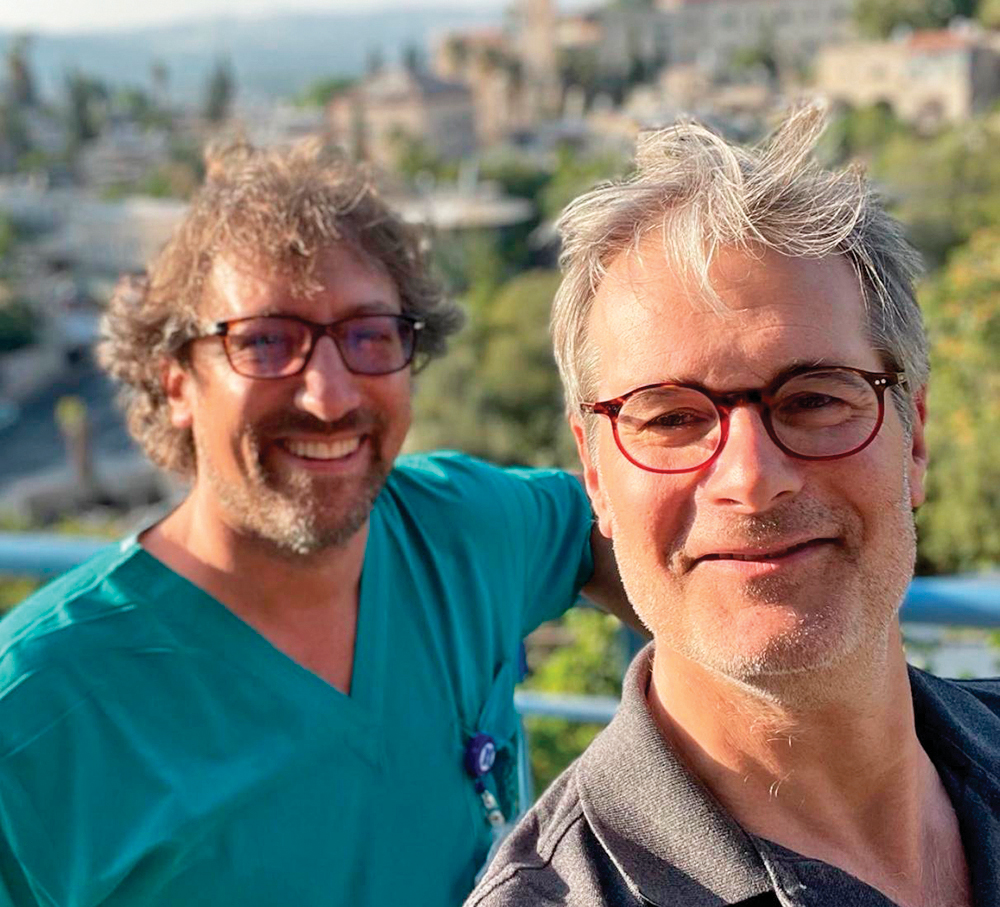
Dr. Jeffrey Fialkov.
As a teenager, Dr. Allan Billig thought he was going to make a career of fixing cars. He liked mending broken machines, and he was good with his hands. The New Jersey native who made aliyah with his family at the age of 10 did not acclimate to a traditional high school setting, so he went to a special trade school where he learned the art of car mechanics. It was only later, during his IDF service as a medic in the paratroopers unit, that he became interested in the field of medicine.
After his military service, Billig returned to New Jersey, where he lived in New Brunswick and studied at Rutgers University. He completed his undergraduate degree at Columbia University, where he began his studies in architecture before transferring into a premed program. He returned to Israel for medical school and received his degree from Tel Aviv University’s Sackler Faculty of Medicine.
During his residency, Billig was drawn to the field of plastic surgery, which he explains “is like mechanics and maybe a little bit of architecture.” He believed that plastic surgery was the field he would be able to best contribute to with his skills. However, that also meant he would have a difficult time finding a job, since placements in plastic surgery in Israel are limited. But a chance encounter would ultimately connect him with Dr. Jeffrey Fialkov, the head of the division of plastic and reconstructive surgery at Toronto’s Sunnybrook Health Sciences Centre. Billig was hoping to land a fellowship, and Fialkov wanted to help a young Israeli who was beginning his career as a plastic surgeon. It was a perfect match.
Billig spent 18 months under the tutelage of Fialkov — whom the former calls “the top guy in North America” — in the specialty of adult craniofacial surgery that deals with injuries to the face, head, skull, jaws and neck. He credits his education to Fialkov, who continues to serve as his mentor. In 2021, Billig returned to Israel. Today, he works as a senior surgeon at Hadassah Medical Center’s Department of Plastic and Aesthetic Surgery, focusing on craniofacial surgeries. He regularly consults with Fialkov on difficult cases, and the two have even performed surgeries together during one of Fialkov’s multiple visits to Hadassah Hospital.
Following the Hamas attacks of Oct. 7, Billig’s focus shifted from elective aesthetic operations to life-saving war-related surgeries. Many of his patients were soldiers dealing with a variety of combat injuries, including burns from explosions, shrapnel lacerations, and bullet wounds to the skull. The latter is one of the most difficult surgeries Billig performs, which involves removing and reconstructing the skull and scalp. Since the war broke out, the hospital pivoted to expand the plastic surgery department in order to meet the demands of injured soldiers. Billig has worked overtime and at times days in a row without significant rest, but he said the volume of injuries has slowed down in recent months. And he added, “None of the soldiers are bitter. They just want to go back to their units.”
Billig knows how crucial every stitch is. Each movement is delicate and performed with total care and patience. But the post-surgery recovery is just as important as the hours in the operating room. “I always try to engage the patient on a personal level,” he explained.
During the early months of the war, Billig received a worried phone call from his girlfriend that her cousin was severely injured during an operation in Gaza, after a wall collapsed on him and other comrades. The young man suffered an orbital fracture, which posed a serious risk to his eyesight. During his fellowship in Toronto, Billig worked with his mentor on a research paper on orbital fracture surgery. Before operating on the soldier, Billig called Fialkov to consult with him. The surgery was successful, and Fialkov even followed up with the soldier during a visit to the hospital.
Billig called these “divine” moments. “Everybody’s crazy in the family,” he explained. “and then all of a sudden, I had the opportunity to help.” When his girlfriend called him, Billig responded, “How lucky are we that I was just trained in this thing, and I can give service to somebody in your family.”
Billig is also a pragmatist. He explained that plastic surgery has its limitations. There is always postoperative scarring, and not every body part will return to its original function and appearance. But he is amazed by the resiliency of his patients and the will of the Israeli people to heal and charge forward. “They learn, eventually, to move on, because you can’t change the past,” he said. “People are not stopping. People are moving forward, finding new roles. The country’s getting stronger.”
Looking ahead, Billig has his eyes set on Hadassah’s new medical center in the Negev town of Netivot, where he hopes to work. “I am just very fortunate that my circumstances, all the good, all the bad, everything, has led me to a point where I can be of important value to a people I care about, to a country I care about, in a very difficult time. And that alone is enough, nothing else really matters.”
Alisa Bodner is a Fair Lawn native who immigrated to Israel over a decade ago. She is a nonprofit management professional who enjoys writing in her free time.










